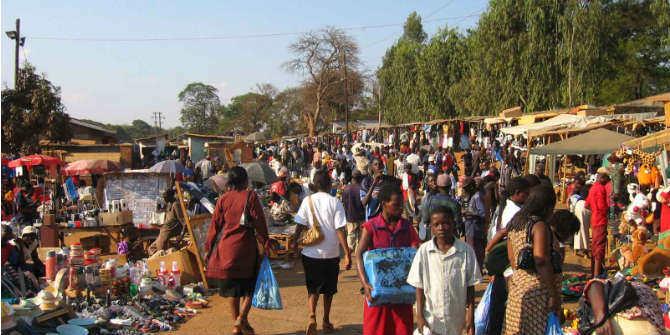Rebecca Sutton says that the volume Making Sense of the Central African Republic goes a long way in reversing the dearth of scholarly analysis of the Central African Republic.
When war broke out in the Central African Republic (CAR) in 2012, those who cast about for reliable analyses were mostly disappointed. CAR has for too long been seen as something of a ‘B-list’ crisis by global observers, its conflicts viewed as a mere corollary to other regional crises. At the same time, violence in CAR is often attributed to internal tensions and the country is depicted as being in the midst of a prolonged, inevitable decline. Such accounts neglect the impact of colonisation, the complex patterns of institutional formation, underlying structural factors such as demographic pressures, and the nuances of CAR’s position in the region. The framing of the recent crisis along straightforward (ex-) Seleka/Anti-Balaka or Muslim/Christian fault lines is merely the most recent instantiation of this tendency to elide CAR’s complex realities.
The lack of high-quality, historically-grounded research on CAR is both a cause and a consequence of prevailing misunderstandings. Seeking to address this, the English-language-edited volume Making Sense of the Central African Republic assembles a veritable A-list of CAR researchers and long-time observers. While the book is academic in rigour, its contributors are careful to emphasise that the poor understanding of CAR is not merely an academic problem. As Carayannis explains, the way CAR is seen in the bureaucratic imaginary of international institutions impacts the effectiveness of interventions. It is telling that the International Criminal Court (ICC) case on CAR, for example, is not in fact about CAR itself. Instead it concerns the involvement of Jean-Pierre Bemba and a Democratic Republic of Congo (DRC) rebel group in CAR.
Probing the CAR-DRC relationship further, Carayannis locates a hybrid form of authority that brings together elements of the state and the non-state, the armed and the civilian, the benign and the predatory. This focus on the intricacies of authority links to a central theme of the book: the (flawed) characterisation of CAR as a weak or failing state. In his contribution, Smith describes how CAR’s citizens experience the state as both ‘a painful absence and a harmful presence’. While failing to provide public goods, the state also exhibits extortionist and coercive tendencies. A paradox of scarcity has emerged in CAR, whereby the more the state underperforms, the more ruling elites engage in concessionary politics. They carve out concessions and allot them to outsiders, transacting the country’s sovereignty out and then asking to be funded to reclaim this very sovereignty. In this way, local elites manage to make significant personal gains in the face of a weak state apparatus.

Credit: DFID / Simon Davis via Flickr (http://bit.ly/1QpGWXb) CC BY-NC-ND 2.0
Dalby also examines how local elites have commandeered the regulatory structure in CAR. He focuses on the diamond-mining sector, where miners resort to transnational commercial networks in order to escape the reach of the state. The notion of escape arises again in Lombard’s examination of the ‘autonomous’ zone of CAR’s north-east. She characterises the attitude of locals toward the state as two-faced: they decry the absence of the state and lament its failure to care for them, while also taking advantage of this very weakness to pursue a range of livelihood activities and parastatal projects. Lombard elucidates a crucial link here between recent violence in CAR’s north-east and the longer-term militarisation of hunting and conservation in the area.
Marchal also explores the micro-dynamics of violence in CAR. In an illuminating discussion about the role of witchcraft and the invisible world, he describes the profound insecurity felt by CAR’s citizens. He draws attention to the relevance of wealth, accumulation and social status; individuals who succeed in private enterprise, for example, are often suspected of resorting to the occult. Drawing on Ashforth’s concept of ‘spiritual insecurity’, Marchal explains that CAR’s residents do not only feel at risk in a physical sense. Rather, they feel their entire metaphysical existence and their understanding of the world is under threat.
As a reader of this book, I did not come away with the feeling that I fully understand CAR. Nor, indeed, do I feel that I genuinely comprehend the violence of the recent crisis. But this should add to, rather than detract from, the book’s value. By introducing a measure of necessary complexity, the book’s contributors avoid the temptation to rehearse the simple narratives that have served CAR so poorly in the past. Those who would argue that this book fails to live up to its ambitious title have therefore missed the point.
Making Sense of the Central African Republic is a must-read for international actors working in or on CAR. In particular, those who locate solutions in a more robust state would be remiss not to grapple with its insights. As this book reminds us, there is nowhere in CAR where ‘nothing is happening’. What is more, it persuades that CAR is a fascinating place—not simply a crisis—worthy of study in its own right.
Making Sense of the Central African Republic. Edited by Louisa Lombard and Tatiana Carayannis. Zed Books. 2015.
Rebecca Sutton is a Canadian lawyer and Trudeau Scholar. She teaches on the Managing Humanitarianism MSc course at LSE where she is currently a doctoral candidate. Her interdisciplinary doctoral project explores how humanitarian actors struggle with issues of distinction in the context of robust peacekeeping missions, and the extent to which IHL delineates the boundaries of humanitarian action. Follow her on Twitter @RebeccaAnneLaw.
The views expressed in this post are those of the author and in no way reflect those of the Africa at LSE blog or the London School of Economics and Political Science.






1 Comments